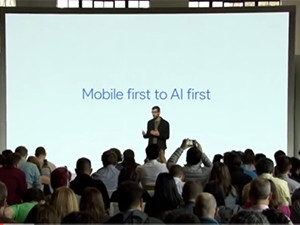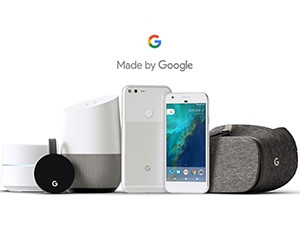
Google predicts in the trajectory of computing, we are moving from a mobile-first to an artificially intelligent (AI)-first world. This was claimed by Google CEO Sundar Pichai at the #MadeByGoogle event yesterday in San Francisco.
A host of hardware products, including a new smartphone, virtual reality (VR) headset and WiFi router, were unveiled at the event. The devices all have one thing in common - Google Assistant integration.
"When I look at where computing is heading, I see how machine learning and AI are unlocking capabilities that were unthinkable only a few years ago," said Pichai.
"This means that the power of the software ? the 'smarts' ? really matter for hardware more than ever before. The last 10 years have been about building a world that is mobile-first, turning our phones into remote controls for our lives.
"But in the next 10 years, we will shift to a world that is AI-first, a world where computing becomes universally available ? be it at home, at work, in the car, or on the go ? and interacting with all of these surfaces becomes much more natural and intuitive, and above all, more intelligent."
He says this is why Google Assistant was built - the smart AI-driven platform that allows users to have natural conversations with it.
Julie Ask, Forrester VP and principal analyst, says: "The 'Holy Grail' of becoming a consumer's virtual assistant will be hard for Google to obtain, but holds unprecedented business value if Google achieves this goal."
Human-level interaction
Google Assistant is similar to Apple's Siri, Microsoft's Cortana and Amazon's Alexa - a voice-activated smart personal assistant.
The company says its technology is differentiated from others because it envisions talking to the assistant as a two-way conversation, a natural dialogue between its users and Google.

Liron Segev, tech analyst and US-based digital agency owner, says: "If we look at the mobile world, the evolution is reaching a plateau as the hardware becomes virtually indistinguishable from each brand."
He says it is software that now makes devices superior to rivals.
"Google has immense software experience, with years of big data analytics and being able to quickly search and index information. Now they are taking that experience and channelling it into action. Integrating AI and the natural language is key. People want to speak 'human' to robots."
However, Arthur Goldstuck, World Wide Worx MD, says: "It is a little early to talk of AI-first unless one is sitting in the heart of Silicon Valley. For emerging markets, it will remain not only a mobile-first world, but a mobile-only world for some years to come.
"AI will make increasing inroads into specific areas of activity, such as smart home controls and payment or log-in authentication, but it will be some years before it becomes pervasive."
Too many voices
The company gave more details yesterday about its smart speaker, Google Home, which works similarly to Amazon's Echo.
Fatemeh Khatibloo, Forrester principal analyst, says: "Google Home is being touted as a competitor to Amazon Echo; in reality they are quite different devices.
"Google Now has been collecting and leveraging significantly more individual user data than Amazon has had access to. This works in the context of a personal device like a watch or mobile phone, but deciding the business rules and data governance around a shared intelligent device is very different and much harder.
"The difference with this being an in-home device versus Google Now [on mobile devices] is the problem of house holding. If there are multiple users of Google Now in a home, Google will have to do a lot of work to prioritise, suppress and manage how it makes recommendations."
These sentiments were echoed by Twitter users during the event.
Brian Katz said: "Curious how Google Home works with a family vs an individual.... Seems tailored for the bachelor/bachelorette."
Mat tweeted: "One thing about Google Home that seems a little weird: families live in homes, but it seems geared solely toward individuals." He went on to say his daily briefing would be very different to his wife or daughter.
US tech reporter Shane Dingman tweeted, in response to Mat: "Yep, Google Home only supports one person's account currently. They say there's a roadmap for adding multiple IDs."
Virtual, comfier reality
The Daydream View, Google's VR headset, was announced last night. It is designed to fit the face better, and has a fabric cover.
It also has a remote that gives another level of interaction in the virtual world. For example, one of Google's partners, Warner Brothers, has created a Harry Potter game that uses the remote as a wand.
Goldstuck says Daydream View was the standout announcement because of the price point of $79 (around R1 085), which is cheaper than other headsets on the market.
"It is the next step in taking VR mainstream, following the low-cost Google Cardboard and Mark Zuckerberg's endorsement of Samsung Gear VR in talking of the next social media interface earlier this year."
Share